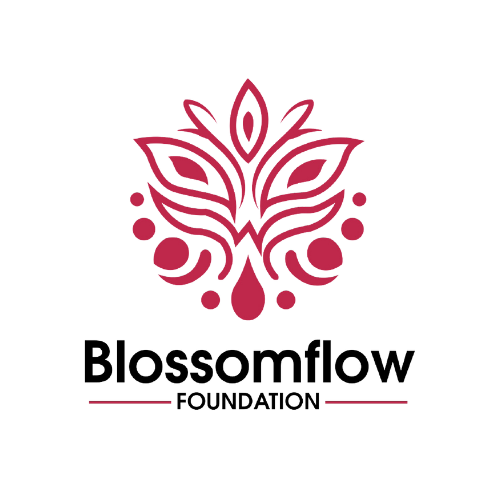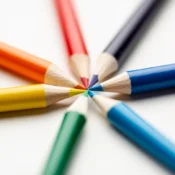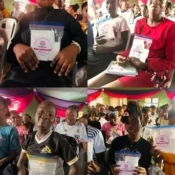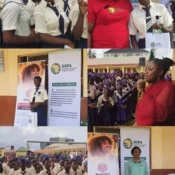
One Pad, One Girl, One Future: The Impact of Pad a Girl Campaign
The Crisis behind Closed Doors
Across Africa, thousands of girls are forced to miss school every month simply because they don’t have access to sanitary pads. What seems like a small challenge has far-reaching consequences: lost learning, crushed confidence, and dreams put on hold.
This is not just a health issue, it’s an education crisis, and it’s one the Pad a Girl Campaign, a collaboration between Blossomflow Foundation and Deborah’s Impact Project Africa (DIPA), is determined to solve.
Nafula’s Story: Breaking Free in Kenya
Nafula, a 14-year-old girl from a rural village in Western Kenya, used to dread her period. With no access to Sanitary pads, she would rely on scraps of cloth or even tissue paper. These makeshift solutions often leaked, leaving her embarrassed and isolated.
“I missed nearly a week of school every month,” Nafula recalled. “Sometimes I thought of quitting altogether because I couldn’t keep up with my classmates.”
Her story changed when a local NGO introduced sanitary pads and menstrual health education. For the first time, Nafula felt prepared and confident. She started attending school regularly, catching up on her studies, and even joined the debate club.
Her journey mirrors the struggles of thousands of Kenyan girls, and the hope that comes when communities take menstrual health seriously.
Kenyan schoolgirl takes her own life after ‘period shaming’
In September, 2019 a 14 year old girl in Kenya took her life. Allegedly, she had soiled (stained) her dress because she was on her period and didn’t have access to sanitary pads, so she bled through her dress. Her teacher, a female, allegedly told her to leave the classroom because she was ‘dirty’. She then went home, it is reported, and she took her life.
It was her first period, her mother told Local Media, and she did not have a sanitary pad.
Ayanda’s Story: Finding Her Voice in South Africa
In Johannesburg, 16-year-old Ayanda faced a different but equally painful challenge. Even when her family could buy sanitary pads, Ayanda was teased at school whenever she stained her uniform. The shame made her withdraw from friends and activities.
“People thought it was funny,” she said. “But to me, it felt like the end of the world.”
When Ayanda joined a school program that provided dignity kits and safe spaces to talk about menstruation, everything shifted. She learned she wasn’t alone, and that periods weren’t something to hide. Today, Ayanda is an outspoken advocate in her school, helping other girls feel supported.
Her courage highlights the power of community conversations to break stigma and restore dignity.
Why Pads Matter More Than We Realize
Nafula and Ayanda’s experiences highlight a wider crisis. Research shows that in some parts of Africa:
- 1 in 10 girls misses school during her period due to lack of sanitary pads and other sanitary products.
- Families living on modest incomes often spend up to 11% of monthly earnings on sanitary pads, an impossible choice between food and dignity.
- Missed school days add up to lost opportunities, lowered confidence, and higher dropout rates.
A simple gift of sanitary pads can mean the difference between falling behind or forging ahead. Between silence and self-assurance. Between despair and dignity.
Introducing the Pad a Girl Campaign
The Pad a Girl Campaign is not charity, it’s empowerment. Launched by Blossomflow Foundation and DIPA, the initiative will reach 1,000 girls across Nigeria, Kenya, and South Africa, beginning in underserved communities like Ikate Elegushi and Oniru in Lagos.
What makes this campaign unique is its holistic approach:
- Dignity Kits: Each girl receives pads, an educational flyer, and an encouragement note.
- School-Based Education: Trained facilitators teach menstrual health and hygiene.
- Peer Conversations: Girls engage in safe spaces to share experiences and reduce stigma.
- Community Dialogues: Parents, teachers, and local leaders are involved in breaking taboos.
The goal is simple yet powerful: to ensure no girl misses school because of her period.
The Impact: One Pad, One Girl, One Future
For girls, the immediate benefits are clear—confidence, restored dignity, and uninterrupted education.
For families and communities, the impact is long-term—open conversations, better awareness, and healthier futures.
For partners and supporters, this campaign offers something rare: measurable results. Impact will be tracked through:
- Number of dignity kits distributed.
- School attendance before and after intervention.
- Awareness levels among students, teachers, and parents.
- Personal testimonials like those of Confidence, Nafula, and Ayanda.
This is change you can see, measure, and celebrate.
Conclusion
A Future Without Limits
Confidence’s box of sanitary pads in Nigeria. Nafula’s return to the classroom in Kenya. Ayanda’s newfound voice in South Africa. These stories prove a simple truth: when you pad a girl, you don’t just give her protection, you give her possibility.
The Pad a Girl Campaign is more than a project. It is a promise to restore dignity, to keep girls in school, and to ensure that periods never pause dreams.
Blossomflow Foundation and DIPA stand united in this mission. Together, they are rewriting the future of adolescent girls across Africa—one pad, one girl, one future at a time.
All Categories
Recent Posts
Why SDG 4 Cannot Be Achieved Without Ending Period Poverty
Tags
Give them a helping hand
Every donation fuels our mission to combat period poverty. Your generosity brings us closer to menstrual equity.
+234-909-482-1642
inquiries@blossomflow.org




